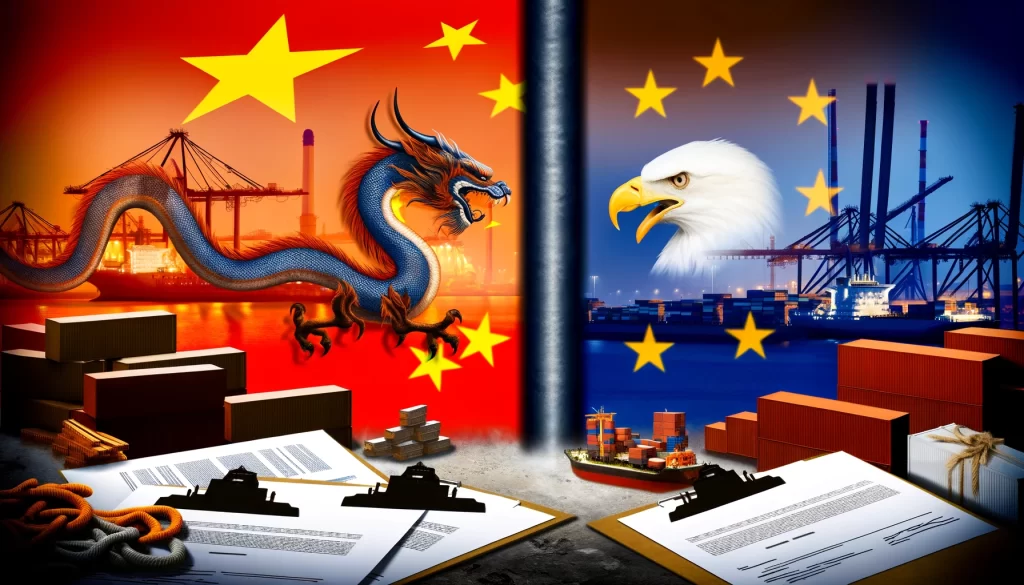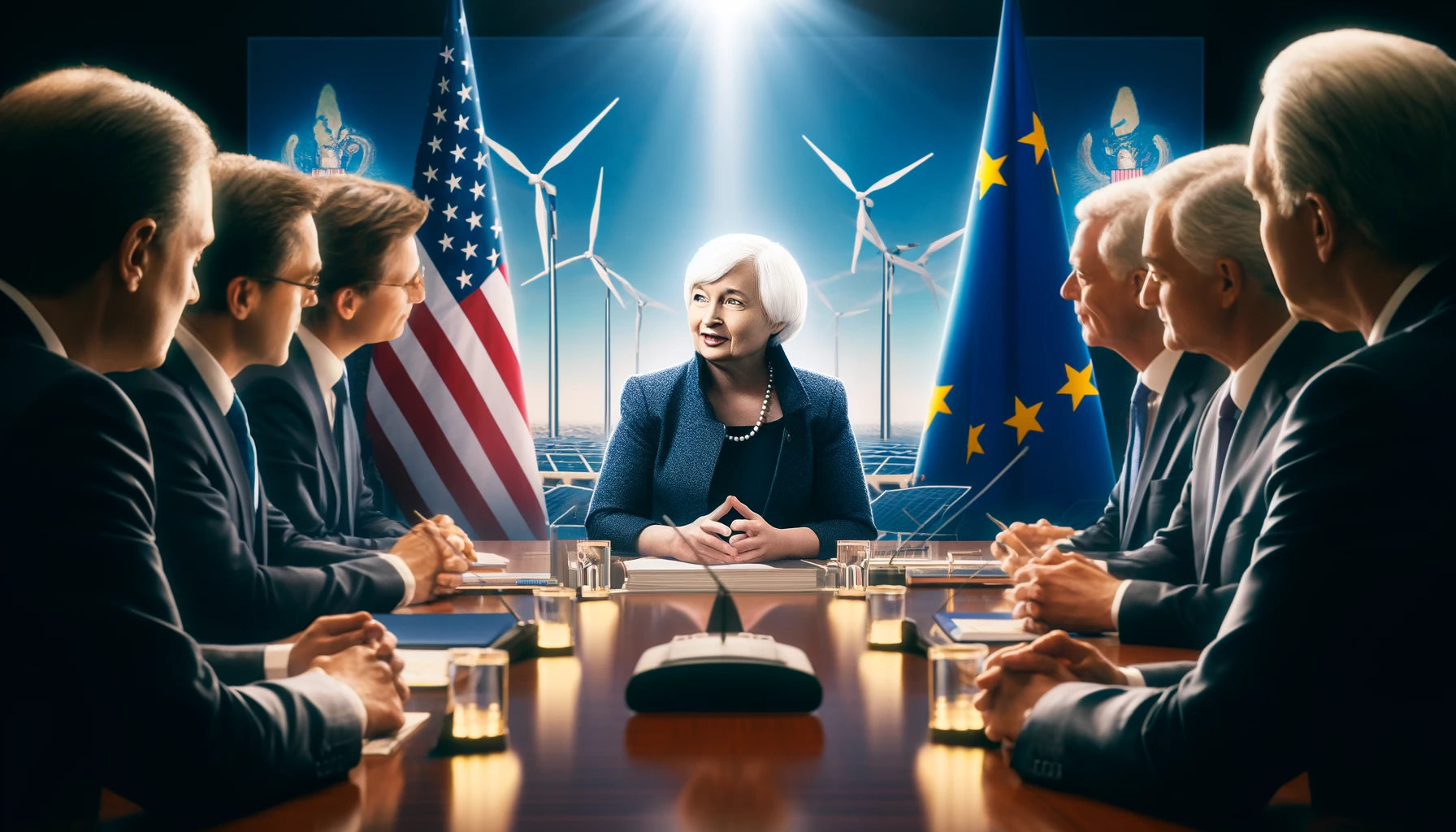FRANKFURT, May 21, 2024 – U.S. Treasury Secretary Janet Yellen emphasized the need for the United States and Europe to address China’s excess industrial capacity in a coordinated manner to safeguard manufacturers in both regions. Speaking in Frankfurt, Yellen warned that China’s aggressive industrial strategy, particularly in clean energy sectors, poses a significant threat to global economic stability.
Yellen’s remarks came ahead of the Group of 7 (G7) finance ministers’ meeting in Italy, where the issue is expected to be a primary focus. She highlighted the urgency of a unified response to counteract the influx of cheap Chinese exports, which she claimed could undermine businesses worldwide if not addressed strategically.
“China’s industrial policy may seem remote as we sit here in this room, but if we do not respond strategically and in a united way, the viability of businesses in both our countries and around the world could be at risk,” Yellen stated.
The Biden administration has recently increased tariffs on Chinese imports, including a 100 percent tax on electric vehicles, in an effort to protect domestic industries from being overwhelmed by China’s production capacity. This move aims to prevent a repeat of the early 2000s “China shock,” which had a detrimental impact on U.S. manufacturing.
Yellen clarified that the United States does not intend to implement a purely anti-China policy but stressed that China’s actions necessitate a coordinated international response. She pointed to China’s ambitions in dominating the clean energy sector as a threat that could hinder other countries, including emerging markets, from developing their own industries.

The European Union (EU) is also contemplating measures to curb the impact of Chinese industrial overcapacity. The European Commission is investigating whether Chinese state subsidies for electric vehicle production are harming Europe’s auto industry. This investigation could lead to preliminary duties on Chinese electric vehicle imports as early as July.
In response to the U.S. tariffs, Chinese officials have criticized the measures as politically motivated. Liu Pengyu, a spokesman for the Chinese Embassy in Washington, stated, “We hope the U.S. can take a positive view of China’s development and stop using overcapacity as an excuse for trade protectionism”.
The situation has created a divide within Europe. Some countries, like Germany, are cautious about imposing penalties that might provoke retaliation from China, potentially jeopardizing German exports. However, other EU leaders, such as Ursula von der Leyen and Emmanuel Macron, advocate for stronger protection against what they perceive as unfair Chinese competition.
Yellen’s call for a joint response underscores the broader concerns shared by many advanced economies regarding China’s economic strategies. As the G7 finance ministers prepare to meet, finding a balanced approach to address these issues without escalating trade tensions remains a complex challenge.
This article is based on the following articles:
https://www.nytimes.com/2024/05/21/business/janet-yellen-europe-china.html

China’s Industrial Policy
China’s industrial policy refers to the government’s strategic approach to developing specific sectors of the economy. The policy involves various measures, including subsidies, tariffs, and regulatory support, aimed at promoting industries like steel, electric vehicles, solar panels, and semiconductors. The goal is to boost China’s economic growth, increase its global market share, and transition to high-tech manufacturing.
Overcapacity
Overcapacity occurs when a country produces more of a product than the market can absorb, leading to a surplus. This can drive down prices and make it difficult for producers in other countries to compete. In the context of China’s industrial policy, overcapacity is a significant issue because the country produces large quantities of goods at lower costs, often due to government subsidies. This situation can flood international markets with cheap products, harming industries in other countries.
International Trade and Tariffs
International trade involves the exchange of goods and services between countries. Tariffs are taxes imposed on imported goods to protect domestic industries from foreign competition, generate revenue, or retaliate against unfair trade practices. When a country imposes high tariffs on imports, it can make those goods more expensive and less competitive compared to locally produced items. This can help protect domestic industries but may also lead to trade tensions and retaliatory measures from other countries.
Group of 7 (G7)
The Group of 7, or G7, is an organization of seven of the world’s largest advanced economies: the United States, Canada, France, Germany, Italy, Japan, and the United Kingdom. The European Union is also represented at G7 meetings. The G7 countries meet annually to discuss and coordinate economic policies, address global economic challenges, and promote international cooperation. The G7 meetings are significant because they can lead to coordinated actions and policies that impact the global economy.
U.S. and EU Trade Relations with China
The United States and the European Union have complex trade relationships with China. Both regions import a significant amount of goods from China, including electronics, machinery, clothing, and increasingly, green technologies like solar panels and electric vehicles. However, they also compete with China in various industries and are concerned about the impact of China’s industrial policies on their own economies. These concerns include the potential loss of jobs, the decline of local industries, and the broader implications for economic stability.
Key Issues Mentioned
- China’s Excess Industrial Capacity: The articles discuss how China’s production exceeds global demand, leading to a surplus of goods in international markets. This can harm industries in other countries, making it a significant concern for the U.S. and Europe.
- Clean Energy Technology: Both articles emphasize China’s focus on dominating the clean energy sector, including electric vehicles, solar panels, and batteries. This dominance is facilitated by government subsidies, making Chinese products cheaper and more competitive internationally.
- U.S. and EU Response: The articles highlight efforts by the U.S. and the EU to respond to China’s industrial overcapacity through tariffs and coordinated policies. The goal is to protect domestic industries and ensure a level playing field in international trade.
- Economic and Political Tensions: The articles also touch on the broader economic and political tensions between China and Western countries. These tensions include trade disputes, retaliatory measures, and differing views on economic policies.
Importance of Coordinated Response
A coordinated response by the U.S. and the EU is crucial because it amplifies their collective influence and effectiveness in addressing China’s industrial policies. By working together, they can implement measures that are more likely to bring about change in China’s trade practices, protect their industries, and maintain fair competition in the global market.

Debate/Essay Questions
- Is China’s industrial policy beneficial or harmful to the global economy?
- Is the focus on protecting domestic industries from Chinese competition justified, or should countries embrace free trade regardless of the challenges?
Please subscribe to Insight Fortnight, our biweekly newsletter!
